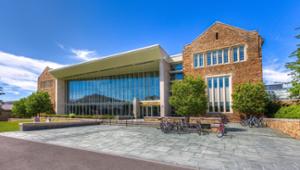A Liberally Educated Engineer

��ɫ����enables students interested in engineering to combine a broad-based liberal arts education with the more science- and math-orientated focus needed to become a successful engineer. We believe this approach expands one’s perspectives and better prepares students to become engineers who think more critically and creatively, communication more persuasively, and act more humanely when working to solve the challenges facing society.
The College provides several dual degree options that allow students to earn a Bachelor of Arts degree from ��ɫ����and a Bachelor of Science degree from the engineering school in five years.
Highly regarded 3-2 programs, where the student spends three years at ��ɫ����and two years at the engineering school are offered with , , and . ��ɫ����also has an agreement with the , which offers a 2-1-1-1 plan. Students who opt for this program spend their first two and fourth years at Hamilton, and their third and fifth years at Dartmouth. Whether pursuing a 3-2 or 2-1-1-1 dual degree program, students must complete the requirements for their ��ɫ����major in three years.
Admission to the programs with which ��ɫ����has formal relationships is based on performance in pre-engineering and general coursework, recommendations from ��ɫ����science and mathematics faculty, and the positive recommendation of the engineering advisor. Pre-engineering courses are required for each program. In addition to these courses, students must complete the requirements for a concentration at Hamilton. The physics, chemistry, and computer science departments accept two engineering courses toward fulfillment of their concentrations.
Some ��ɫ����students interested in engineering choose a more traditional route by completing their ��ɫ����B.A. degree in four years, then enrolling in graduate school for engineering. Depending on your preparation, the type of engineering you pursue, and the program you choose, you may get a B.S., M.Eng., or M.S. in engineering. It is not uncommon for students initially interested in 2-1-1-1 or 3-2 programs to change to 4-x programs to get more flexibility in their courses at Hamilton.
Each engineering school requires students to take pre-engineering courses at Hamilton. The specifics for each program vary for each school, but most students should take up to five math classes (through Calculus III, Linear Algebra, and Differential Equations); two physics courses (sequences only start in the fall semester); one course each in chemistry (fall semester), computer science, and economics; plus one or two courses specific to each type of engineering. In addition, students should take eight non-technical courses. A sample curriculum is available. All students must complete a major (we call it a concentration) at Hamilton, in addition to the pre-engineering courses required for admission to the engineering school.
- Curricular Requirements, Columbia 3-2 Example
- Curricular Requirements,
- First-Year Course Selection for Engineers
For details, consult with the engineering advisor, Professor of Physics Gordon Jones (315-859-4697, gjones@hamilton.edu), Professor Michelle LeMasurier (315-859-4418, mlemasur@hamilton.edu), or ALEX Advisor Melissa Law-Penrose (315-859-4339, mlawpenr@hamilton.edu).
After Hamilton

Storch ’23 Headed to Stanford to Pursue MA in Mechanical Engineering
During her time on College Hill, Merrill Storch ’23 has developed a passion for sustainability through her studies in physics and interest in mechanical engineering. Now, she’s taking her talents to Stanford as a graduate student, where she’ll study how mechanical engineering can be used to address climate change.

Sichlau ’23 Internship at Varian Steers Him Toward Mechanical Engineering
Physics major Jacob Sichlau ’23 interned this summer at Varian Medical Systems on the microwave ablation team. The experience solidified his interest in pursuing a master’s degree in mechanical engineering after Hamilton.


